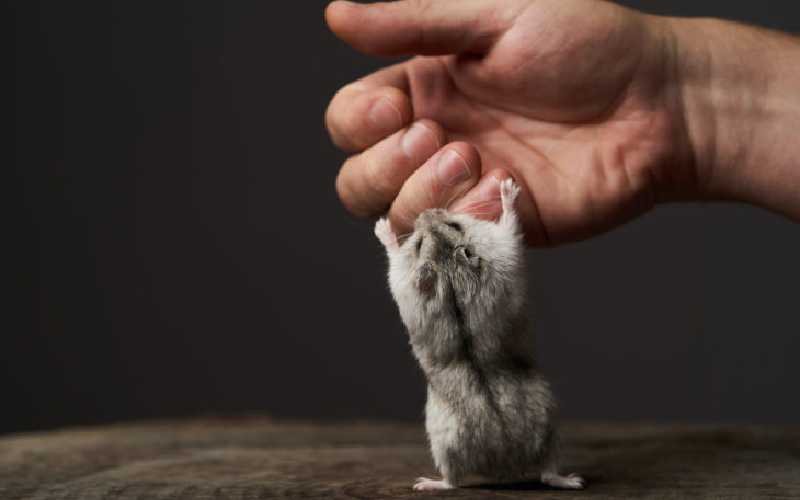hamsterhappy.co.uk is a participant in the Amazon Services LLC Associates Program and other affiliate advertising programs designed to provide a means for us to earn fees by linking to Amazon.com and affiliated sites. Affiliate links may be used on this page and in hamsterhappy.co.uk articles, but they do not impact on the price that you pay and they do help me to get this information to you for free. Read my privacy policy for more information regarding affiliates.
Little animals, big teeth! Hamsters are small and adorable, but they can also be a bit cheeky and feisty. A hamster’s teeth never stop growing, which gives them plenty of chance to nibble, gnaw and bite all throughout their lives and in fact, encourages it. As many other animals, big and small, Hamsters will often use biting as a defence mechanism to try to assure you that you must stay away or they will hurt you. This is programmed into their little bodies from nature, since they are prey to other bigger animals in the wild. Although Hamsters do not believe that humans will eat them, unlike cats and dogs that bite out of excitement and love at times, if a hamster bites you, it is definitely not considered a friendly bite.
A hamster’s bite can be triggered by many things, but in most scenarios they bite when they feel scared of threatened in any way. Most hamster bites are caused by fear and not by general aggression. It is vital for owners to get to know their little critters, as we all know that hamsters have unique personalities. This is the phenomenon that allows us to find that some hamsters are more rebellious than others, irrespective of breed. If your hamster happens to be one of those feisty, untamed ones, we assure you that growing a stronger bond with your hamster will gradually stop them from biting.
It is important that hamster owners know that these little critters do not have the best eyesight. They often rely on their sense of smell to get by and follow their instinctual responses when it comes to scents of any kind. When handling your hamster, it is ideal that you consider the smells that your hands may tempt your hamster with. If your hands smell like something edible, it is likely that your fluff will take a chomp on you just to get a little taste of what they’re smelling. This doesn’t necessarily mean that the hamster means any harm, but it could also mean that. To rule out that possibility, we strongly advice you to consider washing your hands before you handle your hamster at all.
The bond between hamster and owner is crucial when it comes to bitey fluffs. They will not attack someone that they are familiar and feel safe with and around, but they will likely go in for a chomp if they feel insecure. To grow a stronger connection with your little critter, you must be extremely patient. Handling your hamster once a day with affection and care can help reduce these seemingly unprovoked aggressive responses. Rewarding activities could be very helpful in this process. We recommend feeding them treats right from your hand and always making sure that they can smell your scent so that they can feel at east every time they sense you.
Another great alternative is to invest in thick protective gloves so that your hamster cannot get to you, even when trying to do so. This way they will slowly acclimate and get a clear whiff of your scent without any unnecessary bloody sacrifice on your part. Make sure you’re always gentle with your hamster and that you do not make any sudden movements that could possibly startle them or hurt them. Loud noises can be very triggering for hamsters too. If you are patient and kind to your hamster, you will train it to be a friendly little fluff that does not bite the hand that feeds.
If you are interested to know more hamster training techniques, you might be interested in reading about Potty Training your Hamster and Why does my hamster bite me


